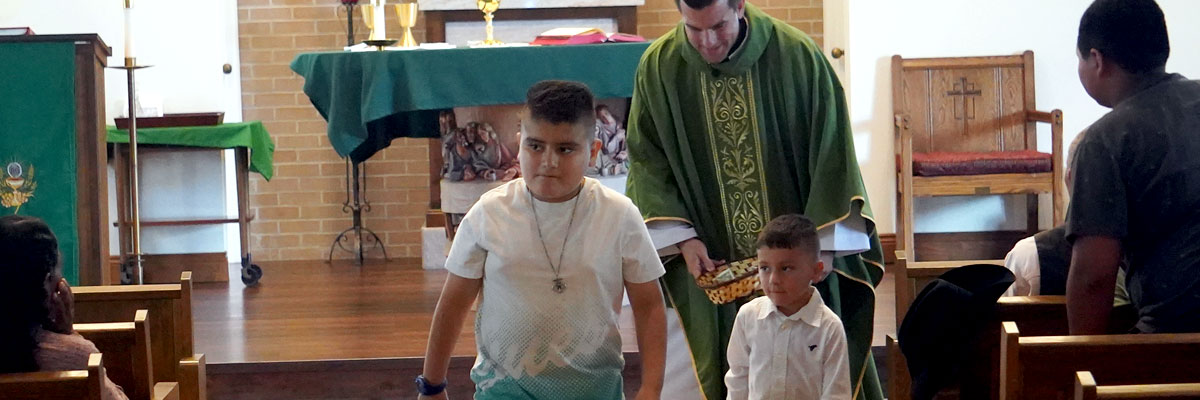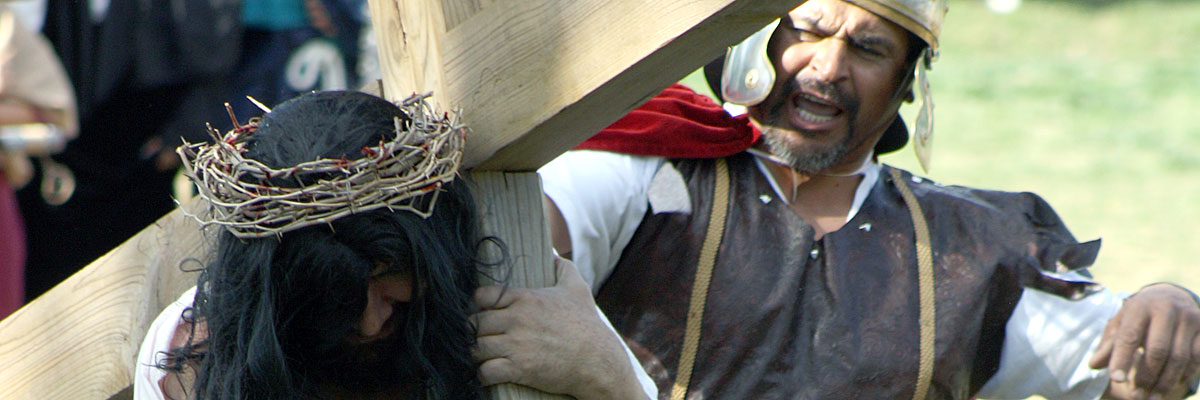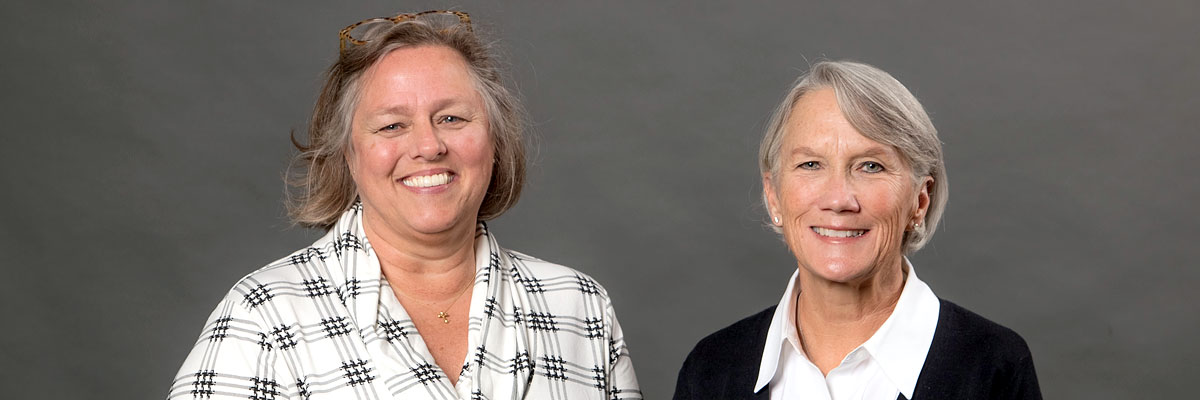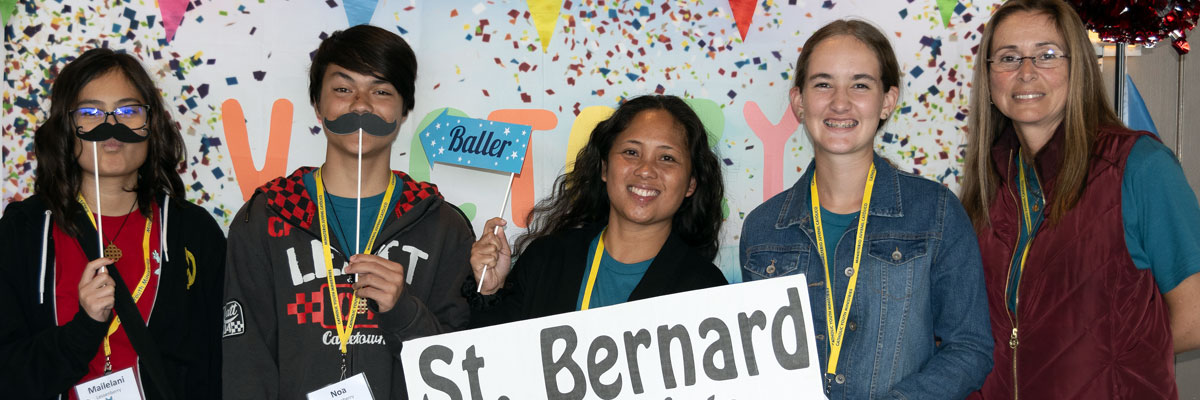Official Website of the
Catholic Diocese of Little Rock
Jesus meant what he said about the Bread of Life
Published: October 22, 2005
By Father Erik Pohlmeier
Catholics are sometimes accused of not relying on the Bible, or of inventing beliefs contrary to the Bible. Of course, neither accusation is true. In this Year of the Eucharist the late Pope John Paul II encouraged all Catholics to become more familiar with the scriptural roots of the Eucharist. This article will examine one chapter of the Bible in which Jesus himself explains the Bread of Life, a teaching as radical in his day as it is now. The sixth chapter of John’s Gospel begins with the famous story of the multiplication of the loaves and the fish. That miracle is followed with Jesus walking on water. The next day the crowd that had been fed is gathered around Jesus again. Imagine the feeling in that crowd. Imagine the anticipation as the rumors about Jesus as a miracle worker had been confirmed in front of thousands of people. There must have been quite a buzz in the air as they waited to see what Jesus would do next. They must have been ready to believe in him as someone extraordinary. Based on what they had already seen they are ready to believe that Jesus can give them this life-giving bread so they ask for it outright. Then Jesus says something they are not ready for. He tells them, “I am the bread of life; whoever comes to me will never hunger, and whoever believes in me will never thirst.” John’s Gospel records that this was hard for them to accept by describing the Jews as, “murmuring among themselves” because of what he said. They say that they know this guy’s family, how can he be so special to claim to come down from heaven? Working a miracle is one thing but this is going too far. Of course, Jesus is just getting started. In response to the murmuring Jesus restates his teaching that he himself is the bread come down from heaven, but he goes on to clarify exactly what he means. In as direct a manner as possible Jesus says, “the bread that I will give is my flesh for the life of the world.” As Catholics who have been trained in this doctrine for many years it is difficult to appreciate how shocking such a statement was. This is describing nothing short of cannibalism. In fact, that very charge has been leveled against Catholics to this day. The quarreling in the crowd only grows at this point with the obvious complaint, “How can this man give us his flesh to eat?” It should not be surprising that the people were so stirred up. Jesus had been speaking of this Bread of Life as something available to his followers but his next statement makes the need for this Bread more urgent. He says, “Unless you eat the flesh of the Son of Man and drink his blood, you do not have life within you.” No longer is it simply available, but those who do not partake are excluded from the life Jesus promises. As expected, the uproar in the crowd only grows. Jesus acknowledges this as he asks, “Does this shock you?” One of the most telling parts of this discourse is the final reaction of the crowd and of Jesus. The disciples of Jesus said, “This saying is hard; who can accept it?” They had arrived at a moment to make a decision. The saying was hard, but Jesus leaves it to them to accept or not. Verse 66 says, “As a result of this, many of his disciples returned to their former way of life and no longer accompanied him.” What is so telling is that Jesus let them go. If it has been a simple misunderstanding Jesus would have called them back. If Jesus had been speaking only in symbolic terms, there would have been no difficulty in accepting what he said. But, Jesus did not say the bread would symbolize his body. He said, “My flesh is real food, and my blood is real drink.” Many could not accept and Jesus let them go. This was a sad day and must have been hard for Jesus. He knew he was offering a gift that had no equal, but required faith to accept. Those who left were lacking that faith. The high point of this exchange was the response of the Twelve. After the other had gone Jesus confronts the Twelve directly. He asks, “Do you also want to leave?” In a moment of great faith Peter speaks for them all, “Master, to whom shall we go? You have the words of eternal life. We have come to believe and are convinced that you are the holy one of God.” They did not say they fully understood what Jesus was talking about, but rather that they were willing to accept his teaching. They believed in him, even when they didn’t understand. That understanding comes later for the Apostles as they share the Last Supper with Jesus and see the offering of his body and blood with the Passover meal. Then with the power of the Holy Spirit at Pentecost they assume the responsibility of continuing the teaching of Jesus without fear. The Bread of Life discourse was a source of great controversy on that day in the ministry of Jesus. It has been no less controversial in the ages since, but the Church has faithfully carried on the dogma of the Eucharist against all criticism. It is a radical teaching, Jesus truly present for us on the altar and in the tabernacles of Catholic churches throughout the world. It is an incredible gift, the body, blood, soul, and divinity of Jesus as our food. The question for each of us in this Year of the Eucharist is the same one given to the apostles, “Will you also leave?” We may not always understand fully, but faith is also a gift. If we can accept Jesus as he comes to us, if we can take his words as he said them, then we can benefit from his promise, “the one who feeds on me will have life because of me.” Father Erik Pohlmeier is the chairman of the Year of the Eucharist Committee and pastor of St. John the Baptist Church in Hot Springs.









